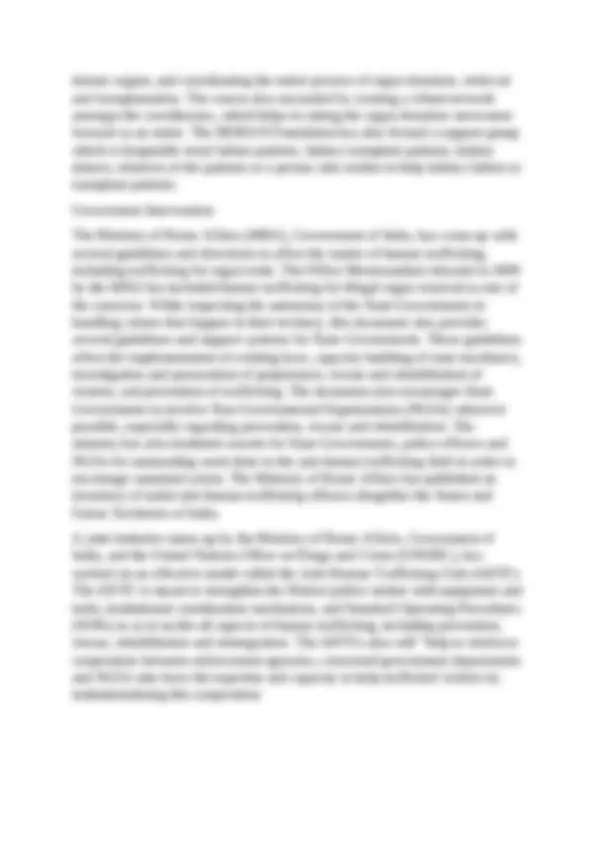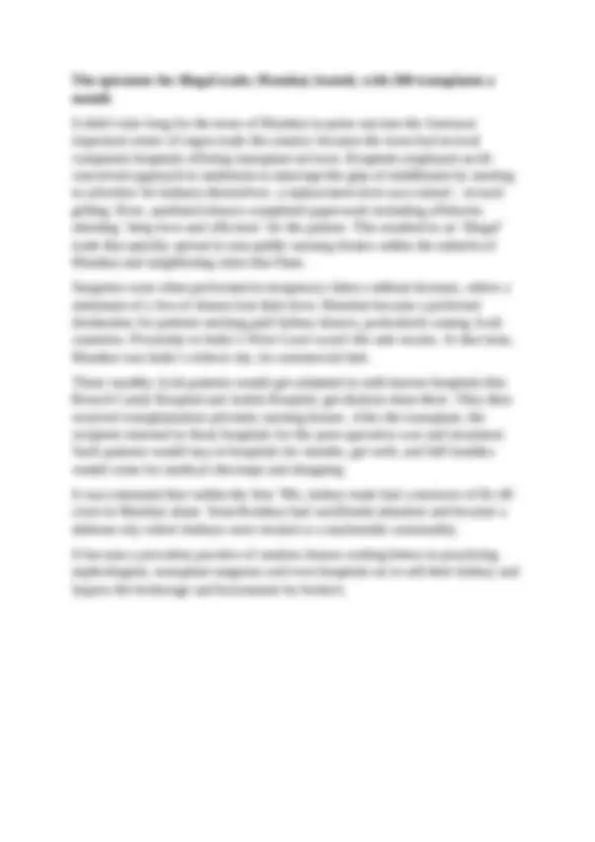




Study with the several resources on Docsity

Earn points by helping other students or get them with a premium plan


Prepare for your exams
Study with the several resources on Docsity

Earn points to download
Earn points by helping other students or get them with a premium plan
Community
Ask the community for help and clear up your study doubts
Discover the best universities in your country according to Docsity users
Free resources
Download our free guides on studying techniques, anxiety management strategies, and thesis advice from Docsity tutors
Organ trafficking in India, a review and case study
Typology: Assignments
1 / 4

This page cannot be seen from the preview
Don't miss anything!



Organ Trafficking in India Organ trafficking is the practice of stealing or buying organs through exploitation to be sold on a black market for profit, and transplant for the purpose of buying and selling. In India, in a year, there is a need for almost 2,00,00 kidneys and only 3% of the demand is being met and out of these only 15,000 can afford for the treatment and only 7,000 can afford for the transplant. Even if one can afford for transplant, finding a matching donor is difficult. This supply- demand gap leads to the illegal transplant and trade of organs and the unwillingness to donate organs also lead to trafficking. Around 2,000 Indians sell kidneys every year. In a lot of cases they sell their kidneys to clear off their debts and rest of them for food and clothing. Kidney sellers in India come from urban slums also as from drought-prone farming districts near the cities where transplant surgeries happen. · In the slums of the urban areas, kidney sellers are largely women. · People sell their kidneys so as to urge out of debt, but eventually fall back to the debt cycle. · Most of the cash they receive by selling kidneys goes into paying off their debts. · the remainder of the cash is employed for marriage, medical costs, legal fees and education of their children. · In many cases, the husbands pack up the cash by drinking. · most of them had no bank accounts and approached local moneylenders once they were in need. “Kidney zones emerge through interactions between surgical entrepreneurs, persons facing extraordinary debt, and medical brokers. As a neighborhood becomes known to brokers as a kidney zone, their look for new sellers intensifies”. Thus, the choice to sell a kidney isn't simply because of a wild of poverty, but also linked to a debt crisis also because the availability of a kidney market. THE TRANSPLANTATION OF HUMAN ORGANS ACT, 1994 was introduced for the (1) regulation of removal of organ/s for transplantation from cadaver donors, (2) regulation of removal of organ from living donors, (3) regulation of hospitals,
(4) regulation of medical practitioners, and (5) punishment for those flouting the Act. Section 370 of IPC which was amended by the Criminal amendment act, 2013, deals with trafficking, it says, whoever, for the purpose of exploitation, (a) recruits, (b) transports, (c) harbors, (d) transfers, or (e) receives, an individual or persons, by (i) using threats, or (ii) using force, or the other sort of coercion, or (iii) by abduction, or (iv) by practicing fraud, or deception, or by abuse of power, or (vi) by inducement, including the giving or receiving of payments or benefits, so as to realize the consent of any person having control over the person recruited, transported, harbored, transferred or received, commits the offence of trafficking. And, Sections 370 (2), (3), (4), (5), (6) and (7) deals with the punishments. A way forward The MOHAN Foundation MOHAN is an acronym for Multi-Organ Harvesting Aid Network and was established in Tamil Nadu, India, in 1997. The MOHAN Foundation is that the brainchild of a gaggle of practicing medical professionals and their friends to market ‘Organ Donation’. To achieve this objective, it works as a support group for Patients, Physicians and therefore the Public. The following have been the objectives of MOHAN Foundation: · Creating public awareness. · Motivating families of dead patients to donate organs. · Training professionals, especially Transplant Coordinators, in facilitating organ donation. · Liaising with Central and State Governments to pass favorable legislation. · Networking with other organ-procuring organizations within the country. · Raising resources to promote organ donation efficiently. One of their several campaigns is to incorporate the ‘clause of organ donation on the driving license’. With 80,000 deaths on the road and almost 40,000 of them being cerebral death annually, this inclusion within the driver's license can save many lives. The MOHAN Foundation succeeded in convincing the govt of India to possess Transplant Coordinators as a compulsory requirement, so as to urge a license for Transplant hospitals. The Foundation conducts Transplant Coordinator Training Programs, which involves training social workers, medical and paramedical staff in counselling families of ‘brain dead’ patients to
The epicenter for illegal trade, Mumbai, busted, with 100 transplants a month It didn't take long for the town of Mumbai to point out into the foremost important center of organ trade the country because the town had several competent hospitals offering transplant services. Hospitals employed an ill- conceived approach to undertake to interrupt the grip of middlemen by starting to advertise for kidneys themselves. a replacement term was coined – reward gifting. Here, unrelated donors completed paperwork including affidavits attesting ‘deep love and affection’ for the patient. This resulted in an ‘illegal’ trade that quickly spread to non-public nursing homes within the suburbs of Mumbai and neighboring cities like Pune. Surgeries were often performed in temporary clinics without licenses, where a minimum of a few of donors lost their lives. Mumbai became a preferred destination for patients seeking paid kidney donors, particularly among Arab countries. Proximity to India’s West Coast wasn't the sole reason. At that time, Mumbai was India’s richest city, its commercial hub. These wealthy Arab patients would get admitted in well-known hospitals like Breach Candy Hospital and Jaslok Hospital, get dialysis done there. They then received transplantation privately nursing homes. After the transplant, the recipient returned to those hospitals for the post-operative care and treatment. Such patients would stay in hospitals for months, get well, and full families would come for medical checkups and shopping. It was estimated that within the first ’90s, kidney trade had a turnover of Rs 40 crore in Mumbai alone. Soon Bombay had worldwide attention and became a dubious city where kidneys were treated as a marketable commodity. It became a prevalent practice of random donors writing letters to practicing nephrologists, transplant surgeons and even hospitals on to sell their kidney and bypass the brokerage and harassment by brokers.